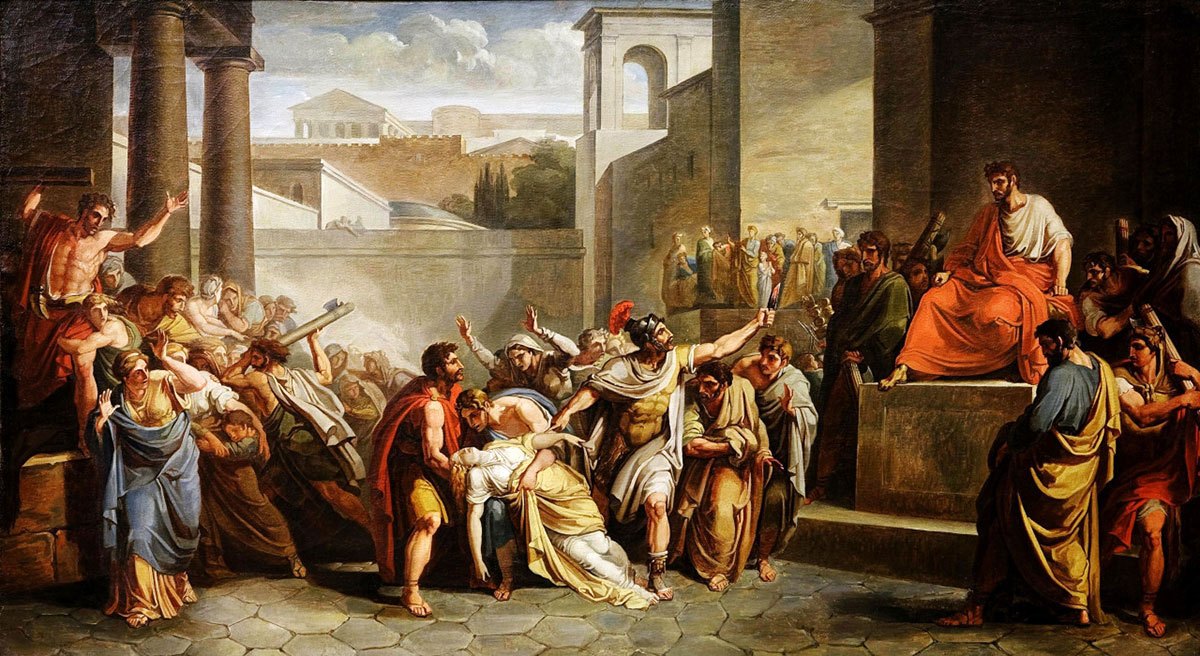451 BC
The Twelve Tables posted in the Forum Roman
The Twelve Tables (Leges Duodecim Tabularum) were published on bronze tablets (or wood) in the Roman Forum by a specially constituted commission called the decemviri (Ten men) legibus scribundis. They were the result of Plebeian agitation for equal treatment under the law. Until that time the law was oral and dispensed under the authority of the Patricians in their role as priests (pontifices). The object of the code was to codify the most important rules of customary law. The law was passed by the Comitia Centuriata as a statute lex duodecim tabularum (law of the twelve tables). Much of the law dealt with proper procedure, most of it in more modern Latin with some phrases in clearly archaic language. The grammar and logic were on occasion inconsistent and the meaning could be ambiguous.
The Twelve Tables were destroyed during the Gallic occupation of Rome under Brennus (Between 390-388 BC), but excerpts survived in ancient secondary sources. Livy tells us about some of them. And Cicero wrote that he had studied them as a student, but by the time he was an adult, this practice had been discontinued.
There is debate as to whether the tables themselves were ever formulated in the manner that Livy describes, or were, as some scholars argue, an imposition of legal forms from later times.
The Oxford Classical Dictionary (N.G.I. Hammond and H.H. Scullard, Editors) Second Edition. Oxford at the Clarendon Press. Oxford University Press, 1970. Page 1100.
The story of Virginia: The abuse of power and the resulting change in government
The Death of Virginia Camuccini 1771-1844.
Shows Virginius with the dead body of his daughter, whom he had slain, standing before Appius Claudius.
Virginia was a beautiful Plebeian girl, the daughter of a well-respected centurion, Lucius Virginius. She was a virgin but betrothed to Lucius Icilius. Appius Claudius, a decemvir, and a Patrician, lusted after Virginia and developed a stratagem by which his client, a certain Marcus Claudius, claimed that she was his slave. Marcus Claudius abducted her. Icilius compelled Marcus Claudius to bring the case before a magistrate, who, unfortunately, was Appius Claudius. Before the case, Icilius with support of the crowd in the forum had Virginia returned to her home. Her father Virginius was away from the city with the army. When notified of the situation, he proceeded back to Rome, with Appius Claudius having his men raise all sorts of obstacles to his return.
The case was eventually heard. Appius Claudius would not let Virginius speak during the hearing and declared Virginia Marcus Claudius’ slave. Virginius asked permission to speak to his daughter, permission was granted. He then slew his daughter. Claudius had Lucius Virginius and Icilius arrested on charges of sedition. But their supporters returned to attack Claudius Appius’ lictors and destroy their fasces (symbols of imperium). This led to the overthrow of the decemvirate.
If you’re interested in knowing more, press the Read More button below for Livy on the Twelve Tables.

